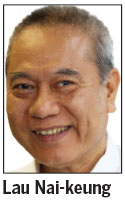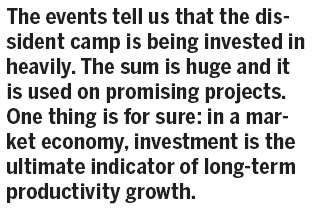Opposition invests in politics
Updated: 2013-05-25 06:11
By Lau Nai-keung(HK Edition)
|
|||||||
Causal observers of the political scene in the city would have been drawn to noises such as the never-ending rounds of filibustering in the Legislative Council (LegCo). "Long Hair" Leung Kwok-hung and Co are again threatening to put everything on hold unless the government does their bidding. This time, however, they are met by somewhat more resolute pro-establishment lawmakers who witness in bewilderment their rapidly lengthening working hours and the strange effect LegCo presidency has on Jasper Tsang Yok-sing in recent years. The thought that the wheel of local history is moved by the deceivingly important struggle between these two groups is indeed tempting.
The truth is, a lot more significant political events happened last week, but you would not see them in the news, at least not on the front pages, because those who were in the know did not want to draw our attention to them. Without editorials and commentaries framing the pieces and putting them into perspective, these events are too obscure for the public to comprehend.

The first event was the launch of the Harbour Times, which claims to be "Hong Kong's first industry publication for the political community". The introduction on its website is then followed by an incorrectly punctuated sentence that elaborates on the market it is targeting: "We will provide a platform for those whose full time work is the business of politics, legislators, senior bureaucrats, lobbyists and their staff will now have a platform for their community."
How the folks at Habour Times are going to earn their living is an interesting question. While the Government Relations Industry Professionals (GRIPs) no doubt have a big budget to spend, they would find it difficult to justify paying for a political advertisement to "reach the political players that affect your business" on a website that few people will ever notice the existence of. But if "political players" are sponsors from the West and the "businesses" are dissident organizations then everything makes sense.
It is most likely that the Harbour Times will be kept running for a while. How much is it going to cost anyway: HK$2-3 million a year? The same benefactors have always been sprinkling sums of this size around town, the only thing new is that, this time, the selling and buying of these "services" are open for all to see.
Last week also on the news was WeiboScope, a project under the Journalism and Media Studies Center of the University of Hong Kong. What it does is scoop up data from Sina Weibo to find out which posts and keywords are censored.
To the dissident media's delight, WeiboScope embarrassed the central authorities. However, the implications of this project are much more far reaching. It tells us how science and technology can be effectively employed against the establishment.

The WeiboScope is valuable to both commercial and political purposes. It can show us in real-time how users are talking about brands, government officials, policies, and pretty much everything else. The technology is not unaffordable, but it is not in the patriots' arsenal as our side in general does not value knowledge.
Last but not least, we saw the release of The House News' mobile app, which no doubt is developed and operated with the mainland market in mind. Not only is The House News active in Sina Weibo (with an authenticated "V account"), users can now also access The House News' new app with their Weibo accounts.
While it is interesting that The House News, a Hong Kong-centric media, is eyeing the mainland market, it is even more interesting that it is supported heavily by Apply Daily. The two are direct competitors - even in the online space - but that does not prevent Apply Daily from allowing The House News to syndicate its "International Finance" columns.
The events above tell us that the dissident camp is being invested in heavily. The sum is huge and it is used on promising projects. One thing is for sure: in a market economy, investment is the ultimate indicator of long-term productivity growth.
The author is a member of the Commission on Strategic Development.
(HK Edition 05/25/2013 page6)